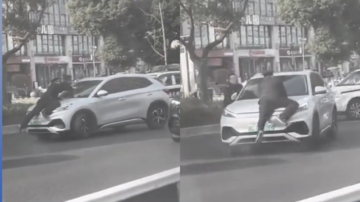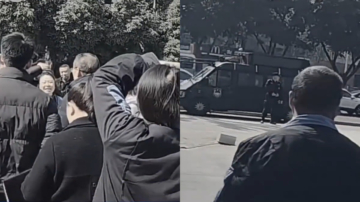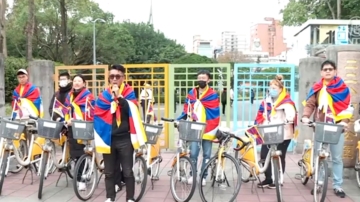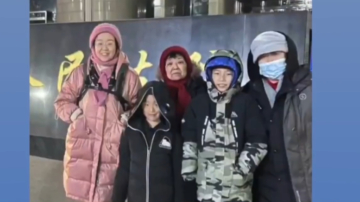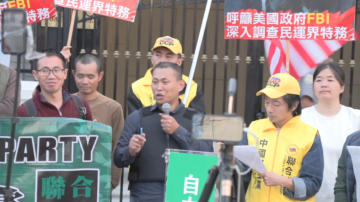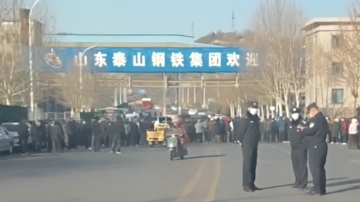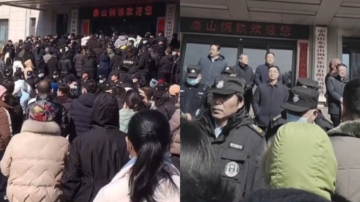【新唐人2013年12月18日讯】近年来,中国大陆冤狱丛生,冤民遍地,冤假错案频频见诸报端,数千万的冤民遍及社会各个阶层,他们在屡战屡败的上访维权过程中,常用下跪的方式喊冤,期望中共能帮着解决问题。但是,大陆维权人士刘飞跃倡议民众不要下跪维权,并指出这种维权方式不可取。
中国《民生观察网负责人刘飞跃,12月17号倡议“维权不下跪”。他在倡议书中写道,“这种以下跪的方式进行维权的行为我们不赞成、不鼓励,还反对。”“因为法律面前人人平等,我们和官员是平等的,官员为老百姓服务是他们的职责而不是恩赐。”
中国《民生观察网》负责人刘飞跃:“我们在日常的维权工作当中,注意到民众,尤其一些民众在维权讨说法的过程当中,经常采用下跪的这样方式,希望官员或者希望政府能重视他们的问题给他们一个说法,解决他们的问题。”
刘飞跃认为这种下跪维权的方式不可取。
刘飞跃:“它是和我们现在所讲的公民的意识,法制社会是相冲突的。我们认为,民众维权讨说法,他和官员之间,政府之间都是一个平等的主体,下跪维权这样一种方式是对我们自身人格的践踏,是对尊严的践踏。”
刘飞跃指出,这些下跪维权的民众中,有失地农民、拆迁户、被辞退教师、下岗工人甚至还有法学教授等。他还注意到,这些维权人在讨说法时,越是人多,越容易发生集体下跪。
前年4月,辽宁庄河曾发生,上千民众在市政府门前集体下跪维权事件;几天后,湖北省公安县,再发生314名民办师在县政府集体下跪维权。
今年4月,数十名山东乳山市非法集资案件中受骗代表,来到当地政府门前集体下跪,请求政府为他们讨公道;9月,湖南双峰县溪口村十多位村民,跪着拦住县委书记的车,请求关停当地某排污的氯酸钾企业。
去年底,59岁的“中央民族大学”法学院教授刘景一,更是带领几十名职工到海南省三亚市信访局门前下跪维权。
作为一个法学教授也用下跪的方式维权!这一事件震惊国际。当时,刘景一无奈表示,走法律途径无望,下跪是唯一的方式。但是他的跪访并没有效果,这些农场职工的问题至今仍然没有得到解决。
中国《天网人权事务中心》负责人黄琦说,最近几年他收到数千张民众下跪维权的图片,他们一张都不登,全部删除了。
中国“天网人权事务中心”负责人黄琦:“我们事后也给当事人说明,如果我们下跪,第一,得不到社会各阶层的同情,其次也会自辱我们的人格,通过下跪这种方式获得权益是不可能的。”
黄琦表示,民众选择“下跪”维权,折射出法律的缺失,也反映出民众的无奈和绝望,他认为,在现行体制下,唯有对抗才能获得权益。
黄琦:“人要想活出自己的地位的话,只有和这种施暴者,或者恐怖者持续的对抗,只有通过对抗,民众才能平等的与官方站在一条线上,平起平坐的谈话,中国近代的历史来看,没有一个人、一个群体是通过乞求,向统治者要求一些施舍来获得民主地位的。”
刘飞跃表示,他们并不奢望一下子能唤醒所有的民众,不再下跪维权,他认为,这些事情的成效,还需要各界的共同推动。
刘飞跃:“比如昨天我这个文章发出来以后,在QQ群,像民办教师、像拆迁户他们的QQ群里发出来以后,很多人都很认可这个事情,他们也纷纷转载这篇文章,也表示维权不应该下跪,应该有尊严的维权。”
倡议书中指出,靠下跪乞求中共官员的良心发现,为你主持公道不靠普,唯有公正的社会制度才是保障每个人的权利,唯有去争取、去抗争才能得到自己的权益。
采访编辑/李韵 后制/孙宁
Don’t Kneel and Cry, Liu Yuefei Asks Chinese Petitioners
Miscarriages of justice and aggrieved people have
become a recognized part of life in Mainland China.
Newspapers are frequented with unjust,
false and erroneous legal cases.
Millions of aggrieved people across all social
classes are often seen kneeling, crying out
after suffering repeating failed petitioning.
They hope to get help through these desperate means.
Chinese human rights activist Liu Feiyue
has suggested that people do not kneel.
He points out that this is not a wise way to petition.
Liu Feiyue, Chief Editor of China’s “Peoples Watch”
website, suggested on December 17 that Chinese
people should undertake petitioning without kneeling.
He proposed that we don’t agree,
or encourage petitioning by kneeling.
Everyone is equal before the law.
Chinese citizens have equality with officials, and it’s
their duty to serve the people, rather than a privilege.
Liu Feiyue: “We noticed that some people
often kneel to attract the attention of officials.
They want them to solve their problems in daily petitioning.”
Liu Feiyue thinks that this method of petitioning is not wise.
Liu Feiyue: “It conflicts with Chinese citizen's
consciousness, and with a constitutional society.
We believe that the public defenders are equal to officials
and kneeling during petitioning is trampling on dignity.”
Liu Feiyue points out that there were landless farmers,
relocated home-owners, dismissed teachers, laid-off
workers and even law professors who were all kneeling.
He also noticed that during the process of
petitioning, the more people there are, the
more prone people are to kneel collectively.
In April 2011, thousands of people collectively knelt in front
of City Government Hall in Zhuanghe City, Liaoning Province.
A few days later, 314 teachers collectively knelt to petition in
front of the county building in Gong An County, Hubei Province.
In April, dozens of representatives in a case involving
illegal fund-raising visited their local government in
Rushan City, Shandong Province, and collectively knelt.
In September, dozens of villagers from Xikou Village,
Shuangfeng County, Hunan Province, collectively
knelt to blockade the county Party secretary’s car.
They were calling for a local potassium chlorate plant to shut
down, after it was found to be discharging damaging sewage.
At the end of last year, 59-year-old law professor
Liu Jingyi, from the Central University of Nationalities,
led dozens of staff members to kneel in the front of the
Complaints Bureau in Sanya City, Hainan Province.
International observers were concerned by the necessity
for a law professor to undertake this form of petitioning.
At that time, Liu Jingyi said it was hopeless to take
the legal route, and kneeling was the only way.
But this didn’t have an effect, and
the problem remained unresolved.
Huang Qi, Director of “Tianwang Human Rights Center,”
said they received thousands of kneeling petition pictures,
and recently, all were deleted without posting them online.
Huang Qi: “We explained that it was impossible to
acquire legal rights by kneeling and demeaning oneself.”
Huang Qi said kneeling to petition reflected the regimes
lawlessness, and people's frustration and despair.
Under the current system, the only way
to acquire legal rights is to fight for them.
Huang Qi: “The only way to have their own legal
position, is to fight against the perpetrators, and
pursue gaining an equal ground with the officials.
Reflecting on modern Chinese history, no one or no
group can get democratic status through begging.”
Liu Feiyue said they don’t expect that to be able to influence
immediate change in people’s behavior during petitioning.
He believes that it needs efforts from the
whole community to promote the effect.
Liu Feiyue: “For example, yesterday I posted
an article on QQ social media, in a private
teachers group, and a group for relocated people.
Many people accepted that petitioning should have
dignity, without kneeling, and reposted the article.”
Liu’s proposal pointed out that it is impossible
to ask for justice through kneeling and appealing
to the conscience of Chinese officials.
The only thing to do is to fight and protect a
person’s right under a judicial legal system.
Interview & Edit/LiYun Post-Production/Sunning
中国《民生观察网负责人刘飞跃,12月17号倡议“维权不下跪”。他在倡议书中写道,“这种以下跪的方式进行维权的行为我们不赞成、不鼓励,还反对。”“因为法律面前人人平等,我们和官员是平等的,官员为老百姓服务是他们的职责而不是恩赐。”
中国《民生观察网》负责人刘飞跃:“我们在日常的维权工作当中,注意到民众,尤其一些民众在维权讨说法的过程当中,经常采用下跪的这样方式,希望官员或者希望政府能重视他们的问题给他们一个说法,解决他们的问题。”
刘飞跃认为这种下跪维权的方式不可取。
刘飞跃:“它是和我们现在所讲的公民的意识,法制社会是相冲突的。我们认为,民众维权讨说法,他和官员之间,政府之间都是一个平等的主体,下跪维权这样一种方式是对我们自身人格的践踏,是对尊严的践踏。”
刘飞跃指出,这些下跪维权的民众中,有失地农民、拆迁户、被辞退教师、下岗工人甚至还有法学教授等。他还注意到,这些维权人在讨说法时,越是人多,越容易发生集体下跪。
前年4月,辽宁庄河曾发生,上千民众在市政府门前集体下跪维权事件;几天后,湖北省公安县,再发生314名民办师在县政府集体下跪维权。
今年4月,数十名山东乳山市非法集资案件中受骗代表,来到当地政府门前集体下跪,请求政府为他们讨公道;9月,湖南双峰县溪口村十多位村民,跪着拦住县委书记的车,请求关停当地某排污的氯酸钾企业。
去年底,59岁的“中央民族大学”法学院教授刘景一,更是带领几十名职工到海南省三亚市信访局门前下跪维权。
作为一个法学教授也用下跪的方式维权!这一事件震惊国际。当时,刘景一无奈表示,走法律途径无望,下跪是唯一的方式。但是他的跪访并没有效果,这些农场职工的问题至今仍然没有得到解决。
中国《天网人权事务中心》负责人黄琦说,最近几年他收到数千张民众下跪维权的图片,他们一张都不登,全部删除了。
中国“天网人权事务中心”负责人黄琦:“我们事后也给当事人说明,如果我们下跪,第一,得不到社会各阶层的同情,其次也会自辱我们的人格,通过下跪这种方式获得权益是不可能的。”
黄琦表示,民众选择“下跪”维权,折射出法律的缺失,也反映出民众的无奈和绝望,他认为,在现行体制下,唯有对抗才能获得权益。
黄琦:“人要想活出自己的地位的话,只有和这种施暴者,或者恐怖者持续的对抗,只有通过对抗,民众才能平等的与官方站在一条线上,平起平坐的谈话,中国近代的历史来看,没有一个人、一个群体是通过乞求,向统治者要求一些施舍来获得民主地位的。”
刘飞跃表示,他们并不奢望一下子能唤醒所有的民众,不再下跪维权,他认为,这些事情的成效,还需要各界的共同推动。
刘飞跃:“比如昨天我这个文章发出来以后,在QQ群,像民办教师、像拆迁户他们的QQ群里发出来以后,很多人都很认可这个事情,他们也纷纷转载这篇文章,也表示维权不应该下跪,应该有尊严的维权。”
倡议书中指出,靠下跪乞求中共官员的良心发现,为你主持公道不靠普,唯有公正的社会制度才是保障每个人的权利,唯有去争取、去抗争才能得到自己的权益。
采访编辑/李韵 后制/孙宁
Don’t Kneel and Cry, Liu Yuefei Asks Chinese Petitioners
Miscarriages of justice and aggrieved people have
become a recognized part of life in Mainland China.
Newspapers are frequented with unjust,
false and erroneous legal cases.
Millions of aggrieved people across all social
classes are often seen kneeling, crying out
after suffering repeating failed petitioning.
They hope to get help through these desperate means.
Chinese human rights activist Liu Feiyue
has suggested that people do not kneel.
He points out that this is not a wise way to petition.
Liu Feiyue, Chief Editor of China’s “Peoples Watch”
website, suggested on December 17 that Chinese
people should undertake petitioning without kneeling.
He proposed that we don’t agree,
or encourage petitioning by kneeling.
Everyone is equal before the law.
Chinese citizens have equality with officials, and it’s
their duty to serve the people, rather than a privilege.
Liu Feiyue: “We noticed that some people
often kneel to attract the attention of officials.
They want them to solve their problems in daily petitioning.”
Liu Feiyue thinks that this method of petitioning is not wise.
Liu Feiyue: “It conflicts with Chinese citizen's
consciousness, and with a constitutional society.
We believe that the public defenders are equal to officials
and kneeling during petitioning is trampling on dignity.”
Liu Feiyue points out that there were landless farmers,
relocated home-owners, dismissed teachers, laid-off
workers and even law professors who were all kneeling.
He also noticed that during the process of
petitioning, the more people there are, the
more prone people are to kneel collectively.
In April 2011, thousands of people collectively knelt in front
of City Government Hall in Zhuanghe City, Liaoning Province.
A few days later, 314 teachers collectively knelt to petition in
front of the county building in Gong An County, Hubei Province.
In April, dozens of representatives in a case involving
illegal fund-raising visited their local government in
Rushan City, Shandong Province, and collectively knelt.
In September, dozens of villagers from Xikou Village,
Shuangfeng County, Hunan Province, collectively
knelt to blockade the county Party secretary’s car.
They were calling for a local potassium chlorate plant to shut
down, after it was found to be discharging damaging sewage.
At the end of last year, 59-year-old law professor
Liu Jingyi, from the Central University of Nationalities,
led dozens of staff members to kneel in the front of the
Complaints Bureau in Sanya City, Hainan Province.
International observers were concerned by the necessity
for a law professor to undertake this form of petitioning.
At that time, Liu Jingyi said it was hopeless to take
the legal route, and kneeling was the only way.
But this didn’t have an effect, and
the problem remained unresolved.
Huang Qi, Director of “Tianwang Human Rights Center,”
said they received thousands of kneeling petition pictures,
and recently, all were deleted without posting them online.
Huang Qi: “We explained that it was impossible to
acquire legal rights by kneeling and demeaning oneself.”
Huang Qi said kneeling to petition reflected the regimes
lawlessness, and people's frustration and despair.
Under the current system, the only way
to acquire legal rights is to fight for them.
Huang Qi: “The only way to have their own legal
position, is to fight against the perpetrators, and
pursue gaining an equal ground with the officials.
Reflecting on modern Chinese history, no one or no
group can get democratic status through begging.”
Liu Feiyue said they don’t expect that to be able to influence
immediate change in people’s behavior during petitioning.
He believes that it needs efforts from the
whole community to promote the effect.
Liu Feiyue: “For example, yesterday I posted
an article on QQ social media, in a private
teachers group, and a group for relocated people.
Many people accepted that petitioning should have
dignity, without kneeling, and reposted the article.”
Liu’s proposal pointed out that it is impossible
to ask for justice through kneeling and appealing
to the conscience of Chinese officials.
The only thing to do is to fight and protect a
person’s right under a judicial legal system.
Interview & Edit/LiYun Post-Production/Sunning

